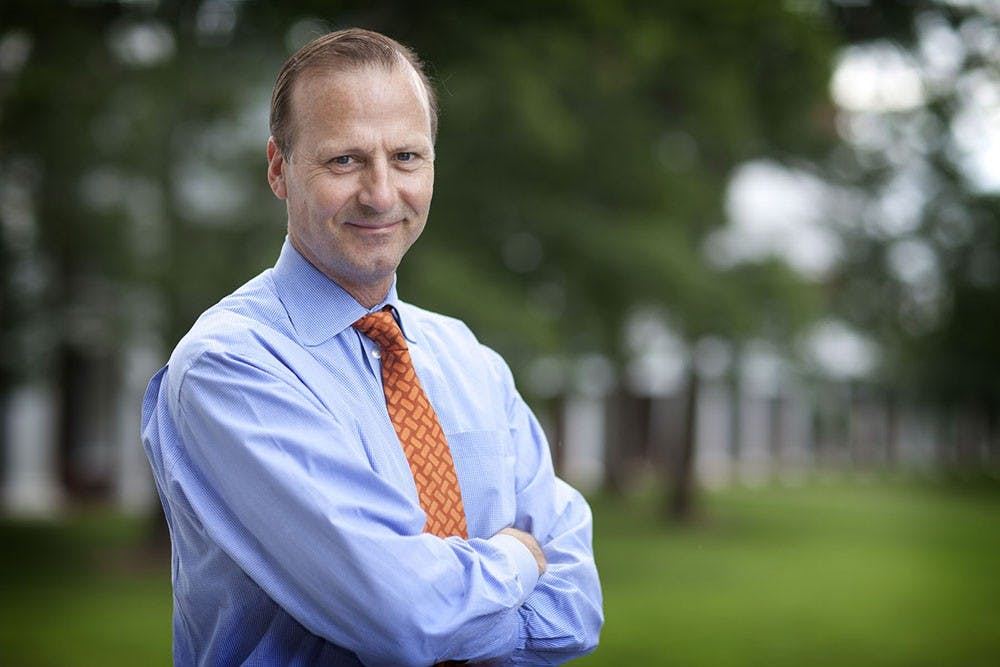The University’s Miller Center hosted experts on India’s history and politics Wednesday for a question and answer session about the future of U.S.-India relations.
The event — titled “United States and India: A Defining 21st Century Partnership?” — was recorded as an installment of the center’s American Forum, a public affairs program produced by the Miller Center which airs on PBS.
American Forum host and executive producer Doug Blackmon was joined by William Antholis, the Center’s new director and CEO, and Jeffrey Legro, the Taylor Professor of politics and the vice provost for global affairs at the University.
A bulk of the discussion was devoted to analyzing India’s new leader — Prime Minister Narendra Modi, who won in a landslide election last year despite what was seen by many as a mishandling of the 2002 Gujarat riots during his time as the region’s governor. The incident, which left approximately 2,000 dead and exacerbated ethnic tensions in India, sparked international criticism. In response, the U.S. refused to grant Modi a visa, barring him from entering the U.S.
Since then, Modi has developed a warm relationship with President Barack Obama. His previous efforts have focused on issues surrounding India’s economic growth, where many of his policies have met with success.
Both Legro and Antholis agreed that U.S. relations with India showed promising signs and that India was on the brink of a major economic transformation.
“Many Indians still live in the country,” Antholis said. “They are facing a generational transition to a more complex economy.”
Antholis and Legro said as with other developing economies, completing that economic transition will come with a host of side effects — in particular, powering India will cause it’s greenhouse gas emissions to spike. Rapid and unruly growth may also further test their federal democratic system.
Antholis said negotiating a climate change deal India will be one of Obama’s biggest tests. He advocated for a more bilateral approach that would reconcile India’s demographic and economic circumstances more effectively than multilateral approaches like the Kyoto Protocol.
Internally, Antholis said India would have to work on restructuring its federal system. India has begun abandoning the British colonial institutions that have formed the basis of its governing system.
Legro and Antholis have spent time in India and offered some insights regarding how India sees itself on the global stage.
“We’re in the midst of a major shift in India where they have realized that they need to be more strategically engaged,” Legro said.
Although China was not the primary subject of the talk, both experts referred to the highly populated developing nation as a comparative tool to examine India’s geopolitical situation.
Following recent border incursions by the Chinese in northern India, relations between the two nations have relaxed, prompting Modi’s government to lean towards the United States. Antholis also said the Indian diaspora in the U.S. is more robust than that of the Chinese. Both nations send their children to study at American schools, but Indian students are more likely to stay in the U.S. than their Chinese counterparts, who often return home.
Legro said only time would tell which system — India’s free-market democracy or China’s more centralized economy — will prove to be most successful in dealing with the stresses of a massive population.
Both guests said the U.S., with huge economic stakes in both nations, will have to balance China and India’s competing interests. Right now, the opportunity for closer relations with India is ripe because America’s soft power is more acute in India.
“For Obama, the India relationship is attractive because of its importance to his Asia pivot,” Legro said. “His goal is to set up a structure in Asia that engages China but also offsets some of their influence in the region.”
Following the discussion, Legro and Antholis took questions from the audience. The episode of American Forum will be aired by PBS March 15.







